In the 90s you'd have been hard-pressed to find a bigger Oliver Stone fan than myself. I'd love to do a chronological overview - maybe someday. Except I'm not a huge fan of his later work, so it'd be kind of a drag for me to get going on the project (and good lord, I'd need an additional hard drive for the amount of screencaps involved for JFK alone) and then slog my way through the last few. More urgently, though, I just don't have the time.
Stone inspires a
lot of snarky internet opinion, most of it ridiculous and demonstrably
false, and everytime I read "conspiracy theory" or "sophomoric politics" re: his work, the urge to throw my own hat in the ring is renewed. Even the sites which praise his work tend to do so through the
most condescending lenses. For this reason, I've never been satisfied with the best-to-worst lists I've seen (story of my life) for him, so here's my own, presented least-to-most-favorite. Feel free to take me to task in the comments.
(No documentaries are included in the list below; that's a whole different list. Ditto for films written by Stone but directed by others. Also not included: info/links about his collaborators.)
19.  |
| (2010) Written by Allan Loeb and Stephen Schiff. |
This is the only film on the list that actually pisses me off for having been made. If it was just some movie about Shia LaBeouf and some poorly-drawn Bernie Madoff cypher, it'd still have been lame. But as a sequel to fucking Wall Street? Good lord. It's like the stupid cable news version of intriguing economic speculation. Isn't there enough of that already out there? There is a montage in the late second act where Gordon Gecko delivers soundbites over his cellphone that reminds me so much of the "Sometimes... it's about the O(outdoors, etc.)" from that old Overstock ad campaign. Except it's old Michael Douglas instead of Sabine Ehrenfeld, in terribly stilted scenes, delivering terribly trite dialogue, in a montage of the damned.
Besides, there already was a much better sequel to Wall Street: 2011's criminally underrated Margin Call.
18.  |
| W (2008) Written by Stanley Weiser. |
Technically, this is not a terrible film. It's just daffy. If I have a consistent complaint about Stone's output in the 21st century, it's that it's so transparently calculating. Here is his "Oh, they'll expect a quote-on-quote Oliver Stone film, an evisceration of an easy target... I'll show them" entry. But the problem is: the Bush/ Cheney years are fertile ground for a quote-on-quote Oliver Stone Film and this is a real misfire. For fuck's sake, it is actually suggested that ol' Dubya ain't such a bad guy; he just wanted to catch the ol' fly ball in center-field once in his life. What is the point of making an inoffensive film about the Bush/ Cheney presidency - even though the aw-shucks insider/outsider p.o.v. of George Dubya is not in and of itself a terrible idea - in the histrionics-On-Demand climate of the 21st century? This film should have been Natural Born Killers pt. 2.
Also: way too soon. If you're going to put out a film about a sitting President, go all out, or go home.
I do admire it for humanizing George Dubya. I didn't think that was possible at the time I saw it. But the other performances are cartoonish - I love Thandie Newton but her impersonation of Condoleezza Rice is absolutely horrific - and its political analysis is simply not compelling. (There's also a baffling scene where we see the Bushes at home, like they're just some family who lives on a regular old block, with curfews and a living room, etc. This is patently absurd.) Josh Brolin, Stacy Keach, and Elizabeth Banks are fine. Just, what's the point of it all? Next.
17.  |
| (2012) Written by Oliver Stone, Don Winslow (based on his novel) and Shane Salerno. |
I haven't seen this one. I bet this is where it falls, though.
16. 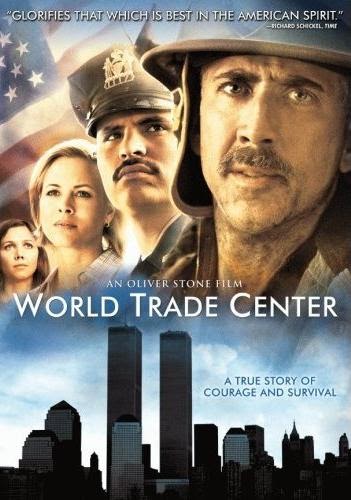 |
| (2006) Written by Andrea Berloff. |
Another one that seems to be a little bit of a calculated move on the big man's part. But let's sweep the whole Oliver Stone thing aside for one moment - an approach that seems part of said calculation to me, but okay - is this a good film? Yeah, it's very competently pieced together. To me, emotionally, it doesn't quite work - this sort of thing strikes me as interesting and nuanced an exploration of heroism as the ALS ice bucket challenge, but perhaps that's simply my personal taste. But if this was Oliver Stone's only film? How would I react? Probably the same way I react to Law and Order, or something. It's accessible, competently made, and competently performed. Not my cup of tea, but I've seen way worse.
Things get better from here on out.
15. 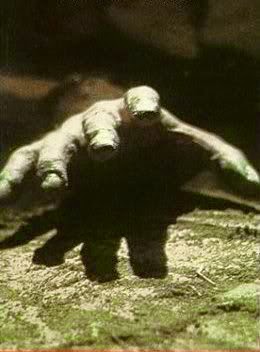  |
| The Hand (1981) Written by Oliver Stone. |
I actually kind of love this movie. But it's a mess, undoubtedly, and unlike the next film in our countdown, there's no covering fire of "Hey, 70s/ drugs/ first effort, etc." (Well, there is, but I'm less forgiving.) Michael Caine is always great, though, and I can't believe there's not a running double-feature of this and Evil Dead 2 on cable or elsewhere.
14.  |
| (1974) Written by Edward Mann and Oliver Stone. |
This is not the easiest thing to watch: bad lighting, experimental design, druggy anxiety, etc. Still, like Cronenberg's Crimes of the Future or similar entries in seminal-filmmakers' back catalogs, a close reading reveals the themes Stone will return to time and again in his work still to come.
Stone has reportedly said the film will never be released on DVD. Which is odd to me. Quick biographical moment: Oliver Stone, as a pretentious young man, writes a pretentious young novel (A Child's Night Dream) which can charitably be described as "terrible." Predictably, no one wants to publish it. Romantically, he hurls the novel in the East River (or the Hudson, I forget - this is all from memory) and enlists for combat duty in Vietnam. Thirty years later, he decides to publish the thing, having saved (or discovered) a copy of it. It's every bit as amateurish a novel as Seizure is - why bury the latter but publish the former?
Of course, in 1997, when A Child's Night Dream was published, Stone wasn't exactly in the most discriminating (read: sober) mindset. Maybe he's embarrassed by it and thus is gunshy about a proper bells-and-whistles release of Seizure. Which is too bad. He got it backwards, if you ask me.
EDIT: (9/8/14) Hold the phones! http://www.collinsporthistoricalsociety.com/2014/09/blu-ray-review-seizure.html
13.  |
| (1988) Written by Oliver Stone, Eric Bogosian, and Ted Savinar. |
Man, this one blew my mind when it first came out. I distinctly remember the Friday night I ordered it from Pay-Per-View and how unsettled I was by it. I was working as a busboy at a restaurant at the time and mentioned to someone how "awesome" Pump Up the Volume was.
"Bah!" replied my friend. "You should watch Talk Radio."
"Okay, I will."
(Cool story, bro.)
I recently re-watched it and had some problems with it. But it's still an arresting performance and script. Bogosian has complained that Stone wasn't really concentrating on the film at hand and was more experimenting with technique in preparation for his then-in-development Born on the Fourth of July. They've never worked together again, for whatever that's worth.
12. 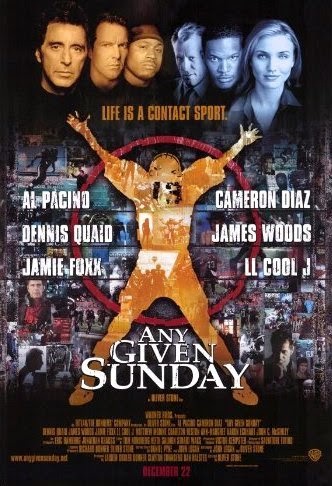 |
| (1999) Written by John Logan and Oliver Stone. |
People love this freaking movie. I do not. I like it, sure, and I love parts of it. But its main flaw is that it's an hour too long. Maybe an hour too short? I don't know: something.
Look, I love football. I love Oliver Stone. And I like this movie. But it's absolutely cringeworthy in spots, and that needs to be recognized. You know those guys who actually manage to tear up at absolute crap like Pearl Harbor? They're out-Pearl-Harbor-ed by some of the things I've heard from people with regards to this movie.
All of that said, it's a wonderful spectacle, and it's amazingly put together.
11. 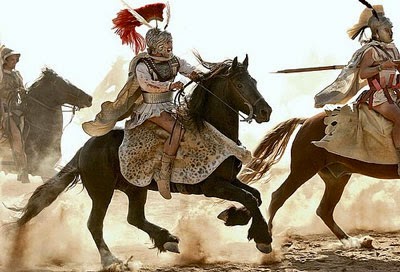 |
| Alexander (2004) Written by Oliver Stone, Laeta Kalogridis, and Christopher Kyle. |
This film was absolutely savaged when it came out. It had a huge budget, and critics gleefully jumped all over its domestic box office failure. The truth is, Oliver Stone had made a lot of enemies by this point, and he was overdue for a savaging. Alexander is not a perfect film, nor is Oliver Stone a perfect man. But this latter point - true for anyone but Stone was perhaps particularly unapologetic about his human foibles - was shoved aside in order to seize upon the former to crucify Stone the filmmaker and project all sorts of pent-up bile and venom on him.
I hate to see that happen. Human beings in herd-mentality are a truly awful sight. Armchair film critics are annoying (I should know - I'm one of them) and professional critics are often not much better.
All of which may suggest that the reaction to
Alexander was the result of lynch mob mentality and that once you get past that, it's secretly a masterpiece. Jim Hemphill, a critic I enjoy, certainly thinks so; he wrote a persuasive
re-evaluation of it.
Myself, I'm just not sold on Colin Farrell as Alexander, so that's tough for me to get past. It's not that he gives a bad performance - he doesn't; he gives a good one - it's just a personal reaction. I feel bad about not loving this film, as I'd like to champion it. It deserves a fairer shake from folks, definitely.
10.  |
| (1986) Written by Oliver Stone. |
For many people, this is Stone's greatest film. I disagree. For one thing, it's broader than a boulevard. A lot of war films are, so I don't necessarily think Platoon is egregious in this regard, but I'm of the opinion that had this come out a few years later than it did, its reputation would be considerably less stellar.
But, it came out in 1986 and set off the Vietnam "craze" of the late '80s. America was emerging from its amnesia (and fantasy projections a la Rambo and Missing In Action) about the Vietnam War. It's true that films like Coming Home or The Deer Hunter or Apocalypse Now, just to name a few, had previously explored Vietnam (and the Vietnam veteran) as a concept, but Platoon clicked with audiences of all political stripes. Vets loved it, antiwar protestors loved it, politicians loved it, Joe the Plumber loved it.
This will likely be the Oliver Stone film that is best remembered in years to come. Deservedly so, of course, but I think the nine selections below are simply better-made films. Not to take anything away from the competence of production value and storytelling here - the set pieces are undeniably impressive - just, as with Any Given Sunday, its best moments are surrounded by dialogue (or accompanied by music) that is much too on-the-nose.
9.  |
| Born on the Fourth of July (1989) Written by Oliver Stone and Ron Kovic. |
Based on the book and real-life experience of Ron Kovic, who actually was, like Horatio Hornblower, born on July 4th, this is a harrowing movie. If Platoon was cathartic for many Americans, this was a further wake-up call. Any film about the (ongoing) appalling treatment of wounded (both psychologically and physically) vets is not going to be easy-going.
 |
| It's the first of many off-book performances by Tom Cruise. He does a hell of a job. |
This film had a long gestation period for Stone. He wanted to make the film with Al Pacino as Kovic after Stone's success with Scarface, but it wasn't meant to be. (When Stone broke the news to Kovic that the film wasn't going to be made, Kovic chased him down the street, swearing at and hitting him repeatedly.) Thankfully, after the one-two punch of Platoon and Wall Street, (not counting Talk Radio) Stone could pretty much write his own ticket, and the result was eight more Academy Award nominations (two won.)
I had a customer at the VFW canteen I managed from 2008 to 2010 who absolutely hated this movie. When queried, he railed against Stone, or rather, his perception of Stone. Never about the film, the specifics of which he didn't quite seem to remember. This is not an atypical experience, either for conversations I had at the VFW or for discussions on Stone's work in general.
8. 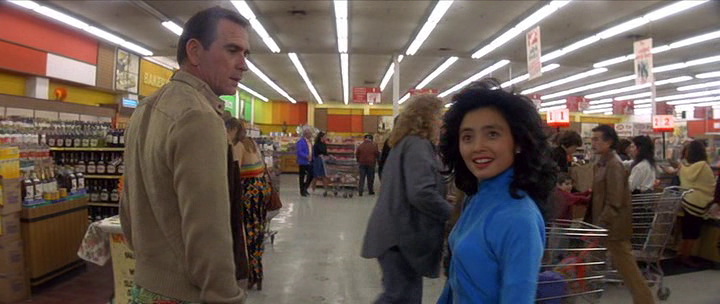 |
| Heaven and Earth (1993) Written by Oliver Stone. Story by Le Ly Hayslip and Jay Wurts. |
When this came out, people were burned out on "Oliver Stone Vietnam" movies. (Something that influenced the film he next put together, Natural Born Killers.) As a result, I think this one never received its due. It's so much more than an add-on to Platoon and Born on the Fourth of July. And as you can see from where I've placed it, I think it's actually the best of Stone's Vietnam trilogy.
It is possible I am overvaluing this movie. So it goes. Watch it again sometime and let me know what you think.
7. .jpg) |
| (1986) Written by Oliver Stone and Richard Boyle. |
Completely overshadowed by Platoon, released the same year, this is a truly underrated film. Allow me to quote Roger Ebert: "The movie has an undercurrent of seriousness, and it is not happy about
the chaos that we are helping to subsidize. But basically it's a
character study - a portrait of a couple of burned-out free-lancers
trying to keep their heads above water."
It is amazing to me that films like this, which, as Ebert writes, speak directly to the global chaos the US government subsidizes, can exist, and yet people go blithely along, voting to aggressively continue said subsidization. But then again, I'm amazed something like Born on the Fourth of July can exist, and yet we still have the VA scandal. Not to mention the endless overseas conflicts that keep the VA supplied with fresh traumatized souls.
How does
the song go? "Some people drink Pepsi / some people drink Coke / The wacky morning DJ says Democracy's a joke."
6. 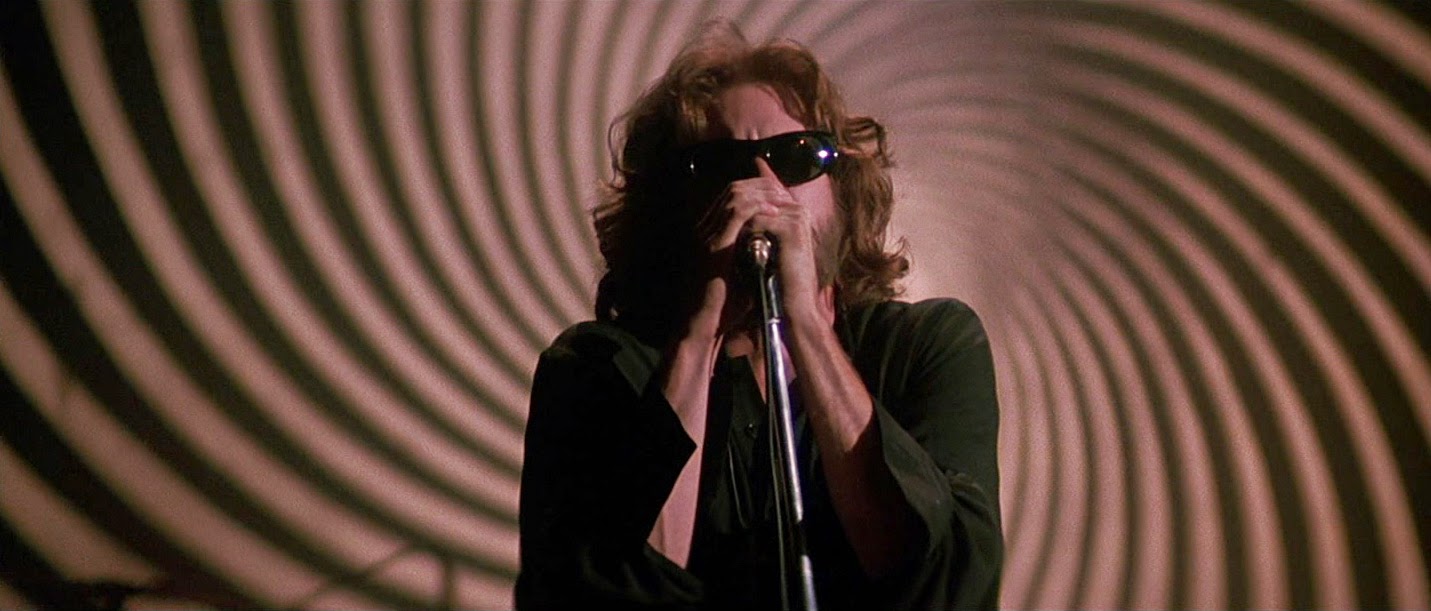 |
| The Doors (1991) Written by Oliver Stone and J. Randall Johnson. |
...YAAAAAAAAAAAAAAAAAAAAUUUUU...
I've read some weird criticism of it over the years, usually along the lines of "overblown" or "excessive." To me this is like criticizing Star Wars for being set in outer space. Excess is this movie. It's neither a celebration or an exploration of it; it is it.
Others took issue with Stone's continued use of Indian shamanism. That's a bit more understandable, but when the subject of your movie made such a point about Indian shamanism, it seems a little odd to criticize the film for including it.
John Densmore got it - this was /is a film about the
mythology of the 60s and Jim Morrison, not about the actual 60s or Doors. Something that sailed over Ray Manzarek's head; he was a tireless critic of the film and brought his own cinematic vision of the Doors (
Love Her Madly) to smaller screens in 2000. (The other member of the Doors, Robbie Krieger, just shrugged and played some twelve-bar-blues.)
Fantastically entertaining, with mesmerizing visuals, and one of the craziest performances ever put on film from Val Kilmer. And the production value is just masterful. (
This scene amazes me - how do you direct a non-CGI crowd like this? In a stadium setting? And pull it off?)
As epic a film as The Fall of the Roman Empire and twice as sexy. (No small feat considering Roman Empire contains Sophia Loren.)
5.  |
| (1997) Written by Oliver Stone and John Ridley. |
Holy frakking moley do people not get this movie. That it continues to be used as some kind of benchmark for "how bad Stone can get" infuriates me. It's more than possible I've overvalued it here as a result. I watched it again maybe four or five months ago and thought it maybe could use a little trimming up, but I saw little to justify the almost universal chorus of disapproval that greets it whenever it's brought up.
It helps if you're familiar with the film noir conventions being satirized, but maybe not. Roger Ebert was far more versed than I in such things, and he hated it, so what do I know. For me, everything clicks.
 |
| Probably my favorite Sean Penn performance. |
 |
| And while I like Joaquin Phoenix better in other films, his performance as Toby N. Tucker "T.N.T." and his needling of Sean Penn's character throughout the movie is hilarious. |
It's dark comedy, but with a horror film's sensibility. I've seen it described as overly pessimistic.... what? I mean, isn't that the point? Or rather, isn't the observation afield of the point? The film is a state of reality beyond pessimism, beyond luck, beyond optimism. It's also, unfortunately, the last of Stone's "hallucinogenic" productions.
4.  |
| Wall Street (1987) Written by Oliver Stone and Stanley Weiser. |
What more can be said about this movie? It's universally hailed as a masterpiece, and rightly so. The worst that can be said about it is that Charlie Sheen is perhaps out of his depth.
But that works in the film's favor, just as it did in Platoon. (It's also remarkable to consider that at one point in time, Charlie Sheen wasn't "Charlie Sheen" and could credibly be cast in a movie like Wall Street.)
It is ironic to say the least that the character of Gordon Gekko - as cautionary and well-drawn a character as they come with regards to greed and quick-buck/ screw-your-family 80s ethos - became, as Variety noted when reviewing the (damn) sequel, "an inspiration to the very power players and Wall Street wannabes for whom he set such a terrible example."
Also, as Entertainment Weekly's Owen Gleiberman
recently noted, Wall Street "reveals something now which it
couldn't back then: that the Gordon Gekkos of the world weren't just
getting rich—they were creating an alternate reality that was going to
crash down on all of us."
The same can very much be said about our next entry:
3. 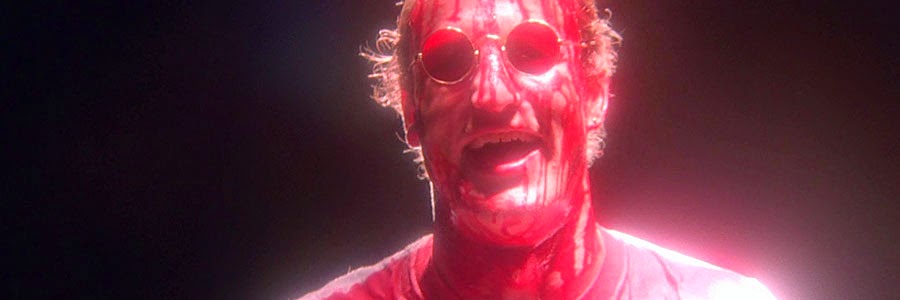 |
| Natural Born Killers (1994) Written by David Veloz, Richard Rutowski and Oliver Stone, from a (heavily revised) story by Quentin Tarantino. |
As with U-Turn, I've read and heard an awful lot of stupid reactions to this movie. Something about Oliver Stone inspires people to wildly off-the-mark hyperbole. I'll avoid discussion of its content, meaning, and prescience and simply say that as a film production, that is to say, on its collective merit of acting, direction, set, setting, theme, editing, etc. this is among the most impressive American films ever made.
 |
| Period. |
 |
| Such an undervalued performance by Tommy Lee Jones, here. Performance-wise, this film is fully loaded. Props to Tom Sizemore, as well. |
 |
| Not to mention this incredibly unsettling sequence with Rodney Dangerfield and Edie McClurg as Mallory's nightmarish parents. |
Stone described making
it as a response to all the criticism he was getting at the time - "I
reacted very much like an American Expressionist, just flinging paint at the canvas." A kaleidoscopic thrill ride down a true Rte. 666 of American culture that I fervently wish was not as close to the truth as it is. My go-to example of how to mix the personal with the political - would that more filmmakers would follow its example.
2.  |
| Nixon (1995) Written by Oliver Stone, Stephen J. Rivele, and Christopher Wilkinson. |
A lot of people consider this to be Stone's best work. (This or Platoon, I guess.) It's hard to argue against it. It's more moderate in its depiction of both Nixon the man and the Nixon presidency than people figured it would be, this being "an Oliver Stone movie" and all. And yet it's meticulously researched and certainly covers a great deal of controversial decisions. It is - almost as if it's a counterattack to the approach taken for Natural Born Killers - a subtle movie.
I still can't believe Anthony Hopkins was able to bring this role to
life as well as he did. Nothing should surprise me about the man's
acting ability, I know, but good lord - did anyone think "Anthony
Hopkins would be perfect as Nixon?" before it came out? Even Hopkins
himself doubted he was properly cast. And yet: brilliant performance.
 |
| Everyone else is great, too. |
A friend once described this as an Oliver Stone movie for people who don't like Oliver Stone movies. I think that's fair. But as with so many other films covered here, I feel the "Oliver Stone"ness of his work can be a (needlessly) distracting projection for people. If you're a fan of moviemaking and/or of myth, then forget the name Oliver Stone and admire the films for what they demonstrably are: masterful creations of light, sound, and shadow.
Perhaps most of all with our final entry:
1.  |
| JFK (1991) Written by Oliver Stone and Zachary Sklar. |
I saw this in the cheap cinema near my parents house (since closed) several months after it came out, and afterwards, I stood by my car and smoked two or three cigarettes, unable to leave the parking lot and simultaneously trying to re-enter reality and trying not to lose the sense of hyper-surrealism/ punctured-veil-of-reality. I won't say it changed my life or changed forever how I viewed American politics (IranContra did that) but it absolutely showed me a holy vision of how films could be made, what they could accomplish. (As much praise is due to its cinematographer, the incomparable Robert Richardson, as to its director.)
It's such an inspiring example of an artist who has achieved a position of privilege who puts everything on the line for something any sensible person would deem "inadvisable." And, knowing full well that doing so will subsequently alienate "the right people," he hits the jackpot.
Like Nixon, JFK has a companion book that should be on everyone's shelf. Relentlessly footnoted, it is (as Stone described the film itself) indispensable "counter-myth" to the absurd fictions of the establishment narrative in all its forms.
It is not my intention here to discuss the "conspiracy theory" or speculations of the film. I'm always happy to talk a little Kennedy assassination stuff, but lost (understandably) in the debate about the content is JFK's absolute mastery of technique. If we were asked to explain films to some alien civilization, specifically, how they differ from other forms of drama, sending them only this movie and Kubrick's 2001 would not be an unreasonable approach. One gains an understanding of the total experience of film from watching JFK that is difficult to put into words. But like I say, beyond its content (which I also find riveting) this is a grad-level class in the integration of sound and image.
And the performances - good lord. How much time do we have? Not enough. Let me mention just one. In a career full of memorable turns, Gary Oldman's Lee Harvey Oswald is burned on my brain:
 |
| "OS-WALD!" |
The script uses composite characters and dozens of familiar faces to navigate its riddle-of-the-Sphinx narrative. This is especially gratifying for subsequent viewings, as different people are always popping out. I've seen this a thousand times (slight exaggeration) and somehow I never properly appreciated the appearance of this character:
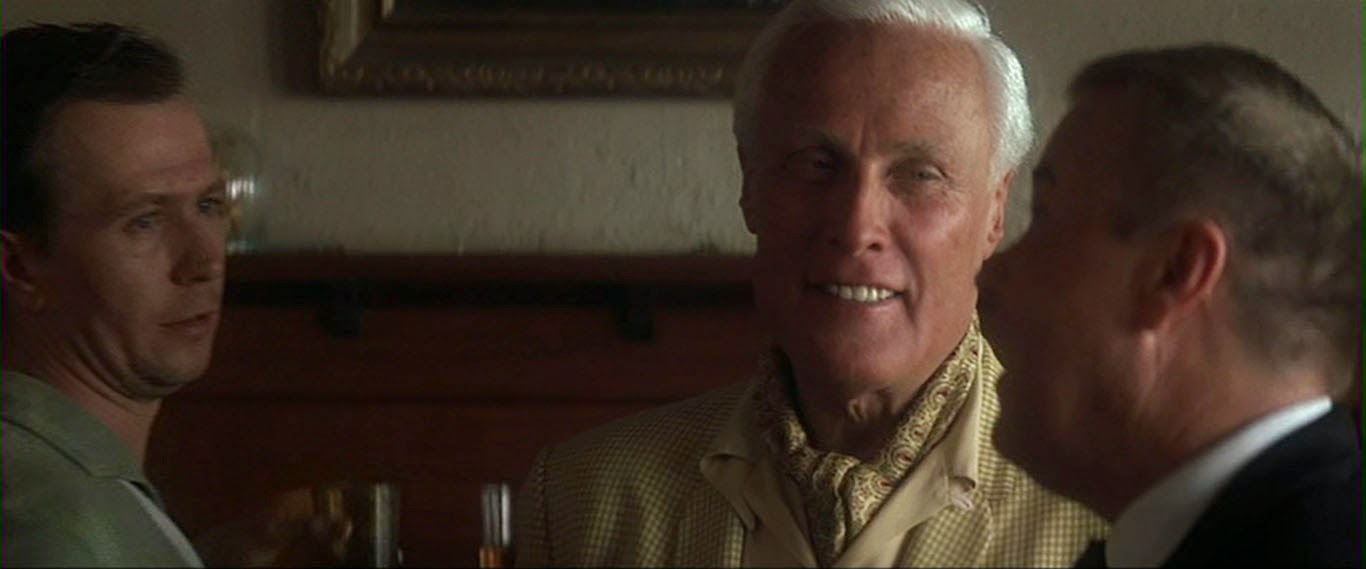 |
| Willem Oltmans as George de Mohrenshildt. |
Granted, reading 11/22/63 by Stephen King is to thank for that one. But it's so rare when a film continues to surprise me on subsequent viewings. One hopes JFK will be marveled at for many generations to come.
~
Oliver Stone seems to be more interested in making documentaries these days. (I have yet to see any of his Untold History of the United States, though I've read good things.) Which is certainly commendable, but I hold out a candle of hope that Stone will produce another film like any of these top 10.














.jpg)






















I clicked the link mostly to see how highly U-Turn would be rated. Was not disappointed.
ReplyDeleteAlso agreed on Any Given Sunday. I hated that stupid fucking movie.
ReplyDeleteI don't want to completely agree with you, so let me scan the rest of the list and I'll tell you what you got wrong.
I like Any Given Sunday, but only when people aren't telling me how great it is. Then I am inspired to rage. It's not a bad movie in a silent room. (And trimming off an hour of it.)
DeleteI saw JFK in Berlin in the summer of '92. I also saw it in Cincinnati. Coincidence? No such thing.
ReplyDeleteIn other news, this is a sound post. You and I are on the same wave length vis a vis Natural Born Killers. So much of everything that filmed endured as a touchstone for the decay of our society / the end-al-be-all of Taratino-esque ultra-violence. God, all those pre-Columbine conversations seem so quaint these days. By the way, Taratino is shit, but I think he's the guy folks like to think of as the vanguard.
I always thought the Doors was bad(ish). Your excess / Star Wars / space comment is spot on, though. My problem with that film was Michael Hutchence of INXS, not Val Kilmer, should have played Jim Morrison. I don't know if Michael Hutchence could act. Too late to find out now I guess. Nor am i sure he could do that accent. But I always thought he looked a far bit more like Mojo Risin than Real Genius.
Also that shit line at the end: "As far as I'm concerned, I made music with Dionysus, man," a ringing reminder of what was so boring about these spaced out knuckleheads. Whether or not it rings true, it's near the top of the list of my most hated bits of film dialogue. That said, the "Not to Touch the Earth" sequence, when mixed with the right amount of brain-altering substances, is not to be beaten.
You know, I've never seen Talk Radio, but I've seen Eric Bogosian on Law and Order: CI and I am not sure he should be acting. I did like Suburbia, though, the film version, for what it's worth.
If you are taking suggestions, do Tarantino next.
Also, I met Michael Hutchence in Dayton after a show at Wright State. He was extremely gracious and friendly, and that concert was ace. I think I am going to have to spend the day listening to INXS.
DeleteI should have mentioned all the Dionysus stuff was indeed as over-the-top as it gets. Phwew. You said it, tho, it's a potent reminder of spaced-out-knucklehead-ed-ry.
DeleteI did a huge INXS bender yesterday, that's funny. I almost posted like 4 videos to facebook. Those guys made some damn fine music. Michael Hutchence definitely had the Morrison look down.
I hear you on The Doors. It was just such an indelible part of my senior year of high school / burgeoning mcknuckleheadedry that its less-than-jake elements happily bounce off me.
Real Genius is such a great flick. God I love that movie.
I hate Tarantino. Except for True Romance. I love True Romance. Thank God he didn't direct that one.
Hmm. I think I'll just make a few comments on each film, working my way down from the top:
ReplyDelete#19, "Wall Street 2: The Streetening" -- I actually enjoyed this movie, but it may only be because I love that Talking Heads song that plays over the end credits. Which is a bad reason to enjoy a movie. Other than that song, the movie entertained me but slid off me completely; I remember nothing else about it.
#18, "W." -- As a movie, it was competently made and entertaining. As anything else, it's iffy at best.
#17, "Savages" -- I huh-huh-HATED this movie, despite how much I like Taylor Kitsch. I wanted to punch somebody in the face. And that somebody was Salma Hayek, who was next-level awful.
#16, "World Trade Center" -- I pretty much agree with you 100% there.
#15, "The Hand" -- Never seen it, but I'd like to.
#14, "Seizure!" -- Ditto.
#13, "Talk Radio" -- Ditto.
#12, "Any Given Sunday" -- I didn't like this movie at all; it felt like a Michael Bay movie, which is a crime I cannot forgive. Granted, I only saw it once; I might be more kind on a rewatch.
#11, "Alexander" -- I haven't seen this one.
#10, "Platoon" -- I've got nothing against the movie, but the one time I watched it, I didn't see what the fuss was all about. That was probably fifteen or so years ago; I'd be curious to see what I made of it now.
#9, "Born on the Fourth of July" -- Great, great movie. Jesus Christ, how can people not recognize Tom Cruise as one of the finest film actors of the last half-century? This one has a fantastic John Williams score, too.
#8, "Heaven and Earth" -- I saw it when it came out, but my only memory of it is of being somewhat bemused by it. I bet I'd get more out of it now.
#7, "Salvador" -- I feel about this one more or less the same way I feel about "Platoon." Good movie, didn't see what the fuss was all about. But again, a rewatch would probably change my mind one way or the other.
#6, "The Doors" -- It's been quite a while since I saw this, but the last time I watched it, I loved it. I'm a fan of The Doors, which probably helps big-time.
#5, "U-Turn" -- I only saw it the once, on opening night. And I hated this movie the way I've rarely hated another. I remember nothing about it except that. Your high ranking makes me want to reappraise it, though.
#4, "Wall Street" -- Great stuff. Despite all the Charlie Sheen.
#3, "Natural Born Killers" -- I adore this movie, not the least because it introduced me to Leonard Cohen. It's totally wackadoo, and some of it in ways that haven't entirely stood the test of time; but overall, I think it's genius. Best line: "These two are the most twisted pair of shit-fucks it has ever been my displeasure to lay my GOT-damn EYES on!" Or something like that.
#2, "Nixon" -- My prevailing memory of this film's release is that it mostly was greeted with shrugs from critics. Or, at least, from the critics I was reading, which was by no means a comprehensive sampling. So I went to see it with somewhat lowered expectations, and was blown away by how good it was. I didn't know -- and still don't, for the most part -- all that much about Nixon, so the politics of the movie slid off me. I just appreciated it as a drama. Oh, and another fantastic John Williams score
#1, "JFK" -- A masterpiece. End of story. Gotta mention that John Williams, too, I guess.
Overall, I'm a casual Stone fan, I guess. He's only made a few films which truly engage me, but those engage me big-time.
Great post!
I've been hearing it from people on U-Turn ever since posting this, ha. If I hadn't rewatched it so relatively-recently, I'd second-guess myself. But what can I say? I think it's a great flick. I miss how Stone used to make movies, with the interior monologue abstractions via black and white/ quick cuts/ hallucinatory recalls, etc. I wish he'd get back on the drugs.
Delete(Or, just make movies like U-Turn again.)
All I can say is, I'm vastly outnumbered in my love for U-Turn. Maybe I'll try and blog it up one of these days to see if I can present a cogent argument for why I think it works.
Natural Born Killers - glad to hear you enjoy this one. I agree on its quotability. Pretty much everything out of Tommy Lee Jones' mouth I say to myself every so often. Just the way he delivers his lines forever cracks me up. "End of the line, Knox!" "We got a riot goin' on in the rec room in B-wing!" and so many others. That soundtrack is killer, as well.
p.s. if Wall Street 2 HAD been sub-named The Streetening, I'd probably bump it up to position 11 based on that alone.
DeleteSPECIAL EDITION CHRISTMAS 2017: Prolonged LOLing at "Wall Street 2: The Streetening."
DeleteI was somewhat surprised, but happily so, that Nixon ranked that high. Personally, I rank it at the top as far as which Stone films I enjoyed most. Well, "enjoy" is not the right word, really; I'm always glad to have seen a Stone film, but I have never been motivated to ever watch any of them more than once. They're often grueling experiences for me - Natural Born Killers, for one example, was just too dark for me to want to delve down into that particular underworld again.
ReplyDeleteJFK is the one I'd place at the top of a list of Stone's best work. It clearly is his best work, his ne plus ultra masterpiece. I can understand that and grok why others love it, but it still left me a bit...cold.
The Doors is pretty much as you've said, more about the era than the band. You know I'm a Morrison fan, so while I could dig this flick for what it was, and enjoy Kilmer's spot-on performance, I still would rather watch some of the Doors documentaries I've seen for my Lizard King fix. But, the movie does capture, along with the '60s vibe, what you and others have termed the "knuckleheadedness" of the band, or at least Morrison and Manzarek. Manzarek was fun to listen to in interviews, because, hoo-boy, when he got going regarding how "what we were doing on stage was REAL, man, we were conducting a ritual" or some-such clap-trap, his enthusiasm was infectious.
Not even Wall Street, more than once? I can understand about not wanting to re-conjure the darkness of his other work - or not even wanting to see certain ones a 2nd time regardless - but that one strikes me as pretty safely rewatchable.
DeleteI love both the Doors and the Doors movie. I had some back and forth with Gaede about that one yesterday after posting this, and he laid out his reasons for not liking it. I can understand and completely respect the logic of where he's coming from. But it's just not that type of movie for me. An imperfect analogy would be: it's like not enjoying "Never Mind the Bollocks" because it lacks a strong character arc from Rick Wakeman.
I used to have the Doors - Live in Europe on VHS. After seeing Stone's movie in the theater and reading Densmore's book, I wanted everything I could find. Ever see that one? (Link: http://www.amazon.com/The-Doors-Live-Europe-1968/dp/B0002CTSXQ)
This list actually makes me sorry I haven't seen as much of Stone's as everyone else.
ReplyDeleteI do have theory about why critics pander most of his stuff, though. For me, it helps to compare Stone's case with that of his contemporary, Martin Scorsese. He has the reputation today of being the Euripides of filmmaking (and granted there's a case to be made there) however, in watching documentary on the Making of After Hours, I was amazed to learn how little regarded he was by the public, if not the critics, at the time. The key point made was that the film scene was undergoing a shift; tight, personal films were out, and audience pleasing blockbusters were in. Now to be fair to people like Spielberg and the good stuff done by Cameron and Lucas, I don' think it's entirely the blockbusters fault, but it is the fault of a kind of mind-numbing on the part of the viewing public (the kind of phenomena you mention in your entry for Salvador) where people are willing to turn off, tune out, and cost on the life devised for them by the Geckos of the world.
I even think that applies to another line of yours: "Armchair film critics are annoying (I should know - I'm one of them) and professional critics are often not much better." I agree that professional criticism hasn't really risen anywhere, especially in the wake of informed and literate critics like Roger Ebert (who could instill a review with a bit of history or philosophy into the bargain). However, if you want to see the lowest common denominator, try spending your time looking up various internet reviewers and watch the uninformed pontificate on they know-not-what.
Also never tell these Howard Stern wannabe's that you think Frozen isn't really a good film, they stop making much sense after that. So why do I keep watching these things? Because sometimes life is kind, and you run into a gem like this:
https://www.youtube.com/watch?v=YMv6PpKKZoo
ChrisC
Have you ever read Scorsese on Scorsese? Great book, particularly about that After Hours period. The backlash against the 70s iconoclast guys was intense in the 80s, definitely. Scorsese still says he feels he has to prove himself all over again after every film (although it's less true these days than at any other point in his career.)
DeleteStone was Scorsese's student at NYU, by the by, in the early 70s.
I'd leafed through that book, I think. It might have been another book on the same director. Either way that says a lot about the value of "Art" in any medium in today's climate (as opposed to the 60s, 70s heyday). The fact that Stone was taught by Scorsese does raise some interesting conclusions. For instance, I wonder if Stone could be considered Scorsese "light". Whereas Scorsese, even in films like Shutter Island mostly tries to be subtle with his stories, Stone takes what Stephen King called a "Jackhammer Approach". I think he said that in a review of WTC, in fact. This is evident in JFK although I think, again what really bothers people about Stone is he won't leave the audience in whatever their comfort level is (a nice sign of a turned off mind (either that or the next president of the U.S.).
DeleteIncidentally, I know this is off-topic but it's sort of neat.
After thinking it over, there are at least four "lenses" through which to understand After Hours.
The first two are sort of interrelated as the film seems to play off two folklore motifs. The first is the trope of a mortal human falling in love with an inhuman elemental of some sort that in turn leads him into what might be called "Other Realms" that are a more or less constant peril for the protagonist.
The related second is the trope about how one small misstep can cause everything to go suddenly off kilter. This is where someone does something wrong, or sees something out of the corner of his eye when he shouldn't, and as a result the whole universe zeros in on the main character.
The third was actually the theory of a film professor who theorized that the whole evening was a set-up, a kind of game of "Freak-out the Yuppies" semi-annually played by New York's Bohemian Soho dweller's.
The fourth, final take is sort of a spin-off of the third. The idea being that the Paul Hackett character is in fact a psychotic murderer, he just blanks out the memory of committing the crimes and how he covered them up. Looked at from this perspective, the character gets almost everything he deserves, and were meant to root for the residents of the neighborhood (almost) because they really are after a killer.
...I'll go take my meds now.
ChrisC
Interesting stuff re: After Hours. I haven't seen it in far too long, but I'll keep that in mind next time I get a chance to check it out.
DeleteI think Stone DOES attack people's comfort zones - that's probably fair. I'd say during his best stretch (Salvador through U-Turn) it was an approach yielded to good purpose. I don't know if I'd say jackhammer approach, myself. And this is something I constantly argued with people about back in the day - actually, in response to this post, one of my old film school buddies said re: U-Turn "As soon as I saw it switch to a quick flash of black and white with Sean Penn, I just rolled my eyes. But that "switch to black and white" is actually used very deliberately - it's showing the audience the character's "inner world," or a flash of their ID. It's not a made-up theory or just a style thing; it's a deliberate storytelling approach. I guess it's subjective, of course - if you don't like such things, it probably comes off as just John Woo and a bunch of slow-motion doves, i.e. over-used, but if you are invested in the way he's telling the story, well, it can be very unique and interesting.
I've got a copy of "Scorsese on Scorsese" but have not read it. I don't see how it could be anything but awesome, though.
DeleteScorsese is one of the all-time greats, no doubt about it. Even his mediocrity is good.
With Stone, I think it's simple as to why he doesn't get the respect that, say, Scorsese gets: too political. There are a certain number of people who, when watching something like "Salvador" or "JFK," will see ONLY the politics. The filmmaking will be of no interest whatsoever; they won't even know it's there. And there a certain number of film fans who, when you put "too much" (their perception, not mine) politics into a movie, will completely check out.
DeleteIt's a forest-for-the-trees situation, in other words. The upside is that it brings its own sort of attention, so it will keep his name well-known when it might otherwise theoretically have become obscure.
There is definitely truth in what you say, here. Though, I wonder: if Stone's later films were as good as Scorsese's have been - good being subjective, of course, but it definitely seems like Scorsese's kept his foot on the gas, Stone's been on cruise control - how his reputation would be.
DeleteThat and the other side of political, i.e. Scorsese seems to cultivate strategic partners and colleagues and friends. Stone seems to alienate subordinates and producers left and right.
Good points all.
DeleteIt feels to me like Stone needs to move to television, and maybe do something like what Soderbergh is doing. He might see it as being beneath him, though.
He's had some success with The Untold History of the USA (on Showtime, I think? I could google... okay, googled: yep, Showtime.) I haven't seen it.
DeleteDitto for Wild Palms, the Stone-executive-produced series from the 90s. I've been meaning to for years. Basically, Stone's output since U-Turn has made me less and less willing to go the extra mile, with all the other stuff I've wanted to read/ watch/ hear, yadda yadda.
One of these days! You're probably right, tho - he might find the tools for reinvention waiting for him on the smaller screen. (Especially these days, when such expansive work is being done on the TV canvas.)
I'd love an Oliver Stone TV series. Lynch did TV. Jane Campion did TV. Good art on TV these days.
ReplyDelete